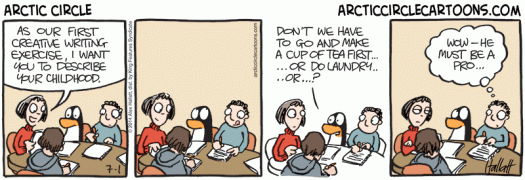
I didn’t want to write today’s post because there’s no letter involved.
Amateur! hissed the little voice inside me. Best you just abandon your website! Can’t even toss off a self-centered little entry about writing? Don’t you have any self-respect at all? Even the little voice was unpersuasive. Fatigue ran through my body. Guts burned. Hackles raised.
I redoubled my efforts, reminding myself that I’d done it before and could do it again. Just when I felt my creative engine restarting, however, despair loomed again. Keep going, I told myself. Little efforts will make a difference. Mountains of ideas seemed to float just out of reach, though. None seemed to land where I wanted. One tantalized me, just up there…. Possibly in my grasp, but no. Quite out of reach.
Ridiculous, this notion of automatic writing. Suppose I did come up with an idea? Then, how do I sustain it? Unless there’s some sort of core backbone, I don’t know how to move from the beginning to the middle. Voids open up in the plot. Where does it end, and how do I keep from repeating myself? Xerox copies of previous sentences seem to be the best I can muster. Yet, I soldier on. Zombies are banging at the door, but…. wait how did zombies get in here?
See how easy that is?
I Love a Good Infrastructure
The A to Z Challenge of April was a lifesaver for me, and I’d like to share a few things I learned as a writer.
Lesson One: An Organizing Principle Drives Creativity
Many of my fellow bloggers write as a vocation. People write books as well as posts, or they write multiple posts, which consume a chunk of their brain space for the day. Writing is a calling. Like exercise, it’s only enjoyable in the past tense, as in I wrote that. The crafting process, where the blank page stares at you, is not so much fun as torture.
Writing has been especially hard during these past weeks, especially beginning mid-March, when the news was so all-consuming. I myself wrote a few blogs about Covid but had to stop because otherwise it would be all-coronavirus all-the-time. Yet writing about other topics feels like trivializing the world. Plus, I read the news for topics, and the news now is all-corona, all-the-time. Even sports and movie news is about how people aren’t playing sports or making movies.
The April A to Z Challenge popped up April 1, for me, out of nowhere. Thank you to the bloggers who embarked on it; apparently, there had been plans for weeks. I can be oblivious. I had no plans before April 1st to write posts nearly every day in April. Suddenly, someone posted “Adage” and another with “Adventure,” and we were off to the races. It became immediately obvious:
The Alphabetic Writing Principle Is Irresistible
There’s a siren song to existing infrastructure. Four calling birds, three french hens… Please Excuse My Dear Aunt Sally. Every Good Boy Does Fine. I have no idea why the English alphabet is arranged as it is (hey! that’s a good subject for a future post!!) but once an organizing principle is there, you can’t help but see it. Med students do this all the time. Here, apparently is an easy way to remember serum protein electrophoresis. Or maybe they’re planning to go surfing.

There’s something about an A to Z challenge that’s different from “see if you can write X words.” Discipline is an important part of this process, but just sitting at the computer or having your special pen and paper ready isn’t enough. The alphabet was a different sort of driver. I couldn’t help but think about topics near and dear to my heart–Shakespeare, Statistics, or Science fiction–there’s another alphabetic idea, words that begin with S.
Next, I had to outline the entire alphabet in advance. Some bloggers, I’m sure, approached it more as a surprise. Today is “K,” what can I write with K? I had to lay out at least a guess about the topics in advance, and in particular I had to have ideas for the hard letters: V, J, Z. Once I had some options for Q and X, I couldn’t help but start “A is for Archery.”
Add Spice to Your Writing Life
I have other writing projects that have ground to a complete halt with the daily distractions. They aren’t even fiction; I know the fiction writers out there are really struggling. How can you possibly write in a pandemic about the pivotal conversation where Melanie tells Dirk that she saw him fingering that Cordoban leather that gives her a skin rash or describe the boat chase through the canals of Venice or worst! the scene where the uber-villain plans to poison the water treatment plant which will kill thousands?–nope! Can’t do it.
Yet, the seductive nature of an A to Z challenge was so irresistible that it prompted me to attach seat to chair, day after day, and pound out a nice daily story about the Olympics, just to see if I could.
Lesson Two: When You’re Stuck, Change It Up a Little
This reminds me of my writing and weeding principle. If you really loathe writing, then go do some weeding. (Or laundry. Or staining that bookshelf.) Many writer friends who are handy around the house have built elaborate furniture in their workshops in order to avoid writing. Some have even built elaborate workshops! You might criticize that procrastination, but a good, handcrafted desk is forever, too. Plus, there are always weeds. Usually after about five minutes with the weeds, I’m motivated to get back to that blank computer screen. When inspiration leaves you, do something different.
I didn’t make much progress on my current writing projects, but with the A to Z challenge I ended up with 40,000 words.
Surprise! You Just Wrote Most of a Book
What was deviously lovely about the A to Z challenge is that it’s rather large. Twenty-six days in a row (or even 26 out of 30) is a LOT of writing.
It wasn’t easy, mind you. I ripped off A, B, and C rather easily–probably too easily. It started to get tedious around H, the one-third mark. Even though I felt confident that my planned topics were good, I still began to fiddle around before starting. L, M, and N started to drag, and I finished later and later in the day. At halfway, I was definitely lagging. You tell yourself that it’s all downhill from here, but that’s not really true. With writing, it’s all uphill until the end.
At about the 80% point–U and V–I really didn’t want to keep going. Marathon runners don’t hit The Wall at 24 miles, but at 20 miles. I told my spouse, who is a professional novelist, that I just couldn’t keep going after T, and she just laughed. “Welcome to Heartbreak Hill.” I didn’t know that was a thing, but it was all uphill.
Last year, when I wrote daily traveling blogs, there were only 17 of them, and even that surprised me that I could do it. At least, when you’re going places every day, you can write about what the different things you see. But 26 is a LOT. At day 12 and day 22, I didn’t think I would make it, but I did. I was so happy the day I woke up to write Z, I can’t tell you. It didn’t even matter what the topic was–I could have written 25 words about Zambia’s Olympic team and pronounced it a success.

I’m not a fan of Nanowrimo, personally. That’s in November where writers are inspired to bang out 50,000 words for their novel. It has become a big thing on social media and created all this side distraction–use these hashtags, post your word count, tweet about how you are writing–that seems to me takes attention from the project itself. Like how people run circles in their house or attach the counter to their dog just to reach their Fitbit goal. If you enjoy Nanowrimo and have written quality work through that process, more power to you. It doesn’t work for me.
When the goal is a word count itself, the blank space still feels like torture. When the goal is Something Else, even constructed around something artificial like using the alphabet, it may be more achievable. I’ve got a good start on an Olympic book, a topic that I love, if I want to pull those 40,000 words together in a cohesive shape.
Lesson Three: Writers Can Accomplish a Lot More than They Think
Plus, for better or for worse, the A to Z challenge has demonstrated that I can muster the discipline and creativity to churn out 1500 words a day for nearly a month. I will never again be able to tell myself that I just can’t write that much.
Bummer.

